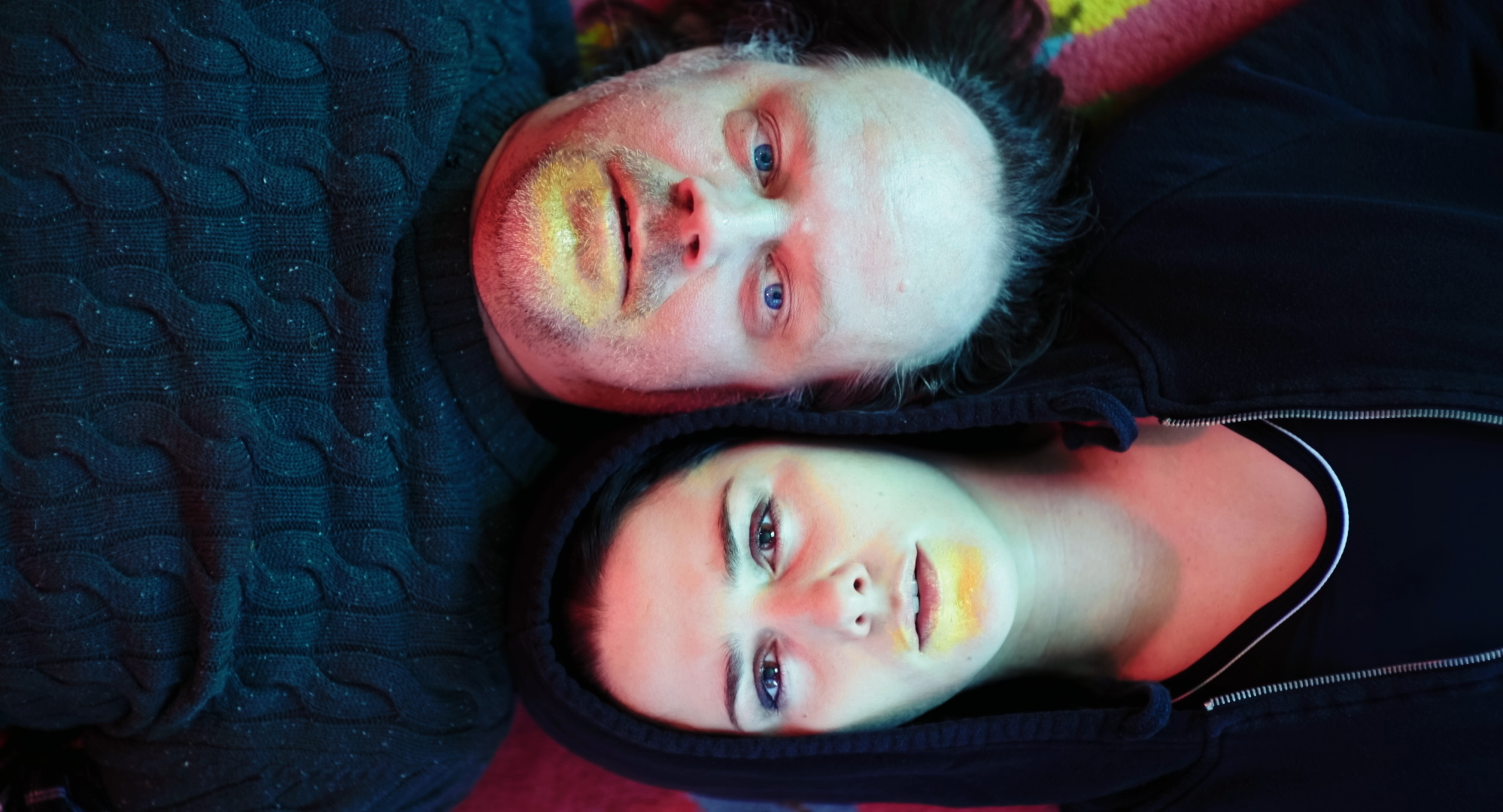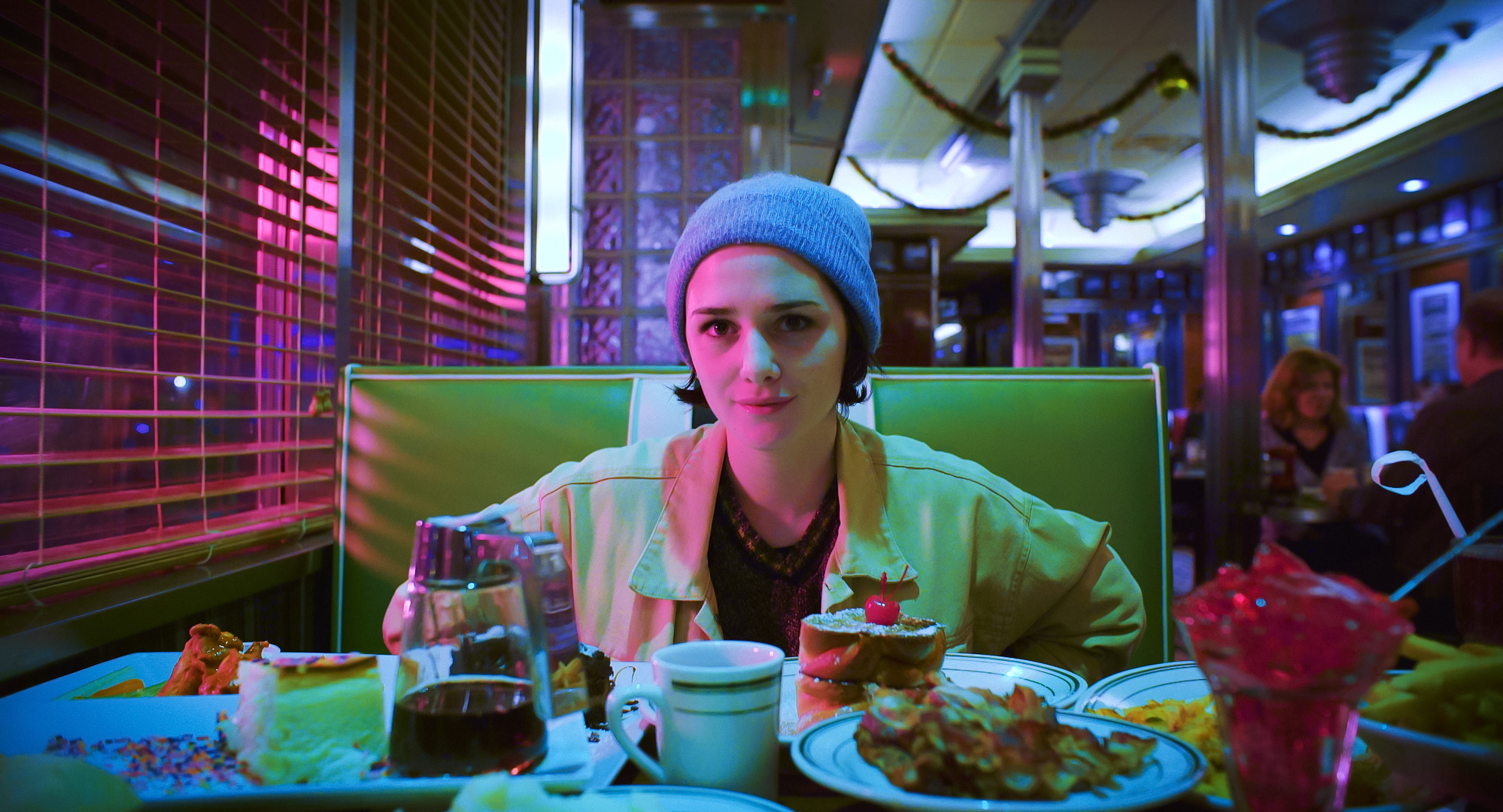Addison Timlin needed to play Kiya because she had no idea how to. Morphing into the social media-obsessed teenager she stars as in Robert Mockler’s phantasmagorical thriller Like Me can’t have been an easy challenge. In the opening scene, Kiya holds up a gas station armed with a gun and an iPhone, filming the frantic cashier as he throws pretzels in the air like confetti and urinates on his own leg. Subsequent actions that give a whole new meaning to “doin’ it for the ‘gram”: seducing a sleazy hotel owner just to force-feed him snacks, and abducting a homeless man en route to a late night diner binge.
And that’s long before we get to the stomach-churning final scene. At least there’s no avocado toast.
Like Me holds a surreal, neon-soaked mirror up to our obsession with online validation. Kiya is a loner who uploads the fruits of her midnight escapades to YouTube before hungrily tracking each video’s view count. “I thought that there was a lot on the page that made this character really difficult to like, which is ironic given the title,” Timlin tells i-D. “I’m a real sucker for a challenge.”
Timlin also seems a sucker — consciously or not — for uncannily prescient film roles. As Like Me drops into the aftermath of Logan Paul’s appalling suicide forest stunt, Timlin is prepping for the arrival of her follow-up film. She’ll play a young Hillary Clinton in an anti-biopic set during the former presidential candidate’s summer of ‘69, when she was working at an Alaskan salmon cannery. The film, titled When I’m a Moth, is an allegory of not just America but also about the free will of ambitious young women. We talked to Timlin about playing angsty teens and potential presidents, and what they both have in common.
What made you most excited about playing Kiya?
It was a really exciting journey for me to find her humanity. The world that we live in right now, with social media and these arbitrary feelings of validation coming from these clicks and numbers that you can’t quantify… I found that she was a young woman who didn’t necessarily identify with that. I think she’s an artist — she’s doing a bit of a social experiment. She’s saying, “If this is what you’re like, you’re just as bad as the person executing it.” I also found her to be a very depressed and isolated young woman trying to figure out who she is and not being able to in the climate of this world. She got to so low of a place that she had nothing to lose.
The film feels even more eerily relevant in light of the Logan Paul controversy, and debates around where platforms like YouTube should be drawing lines. How did you get inside the mind of someone who seems to have no boundaries?
When I was preparing for this role and trying to shape the narrative of Kiya and the bones of her soul, I thought about where to draw the line in the sand, and how far is too far. I came to the conclusion that there was no line in the sand for her. The way she viewed her own life and how deep her trauma was — even if she lost her own life in this experiment, that was kind of okay. It was fun to play this person who had nothing to lose and was trying to make a statement. People and things kept proving to her that there is such a lack of humanity in the world today.
As far as I know, you haven’t robbed any gas stations, but you are pretty open about posting on social media. How do you approach Twitter and Instagram knowing that you have an increasingly large following? Do you feel a sense of social responsibility?
I go back and forth on it. I used to have a private account and a public account, then I realized that I didn’t want to live my life that way. I didn’t want to have to censor who I was because it might be polarizing for a potential fan base or whatever. I have a slightly off-color sense of humor and I’m very expressive about that on Twitter. My Twitter feed is a bit like a character that I play — a much darker, drunker, sadder version of myself. Instagram can be flippant and fickle — I don’t think that a picture that I post is going to have a big impact on the world, and if it has an impact on people’s perception of me, I don’t really care all that much. It kind of bums me out that we’re not doing things for our own experience, but for other people to validate it.

You also played an angsty teen, albeit one studying at a nunnery, in 2016’s Little Sister . That film really spoke to me as a reformed emo kid. Did you have a goth phase as a teenager?
I really didn’t. I’ve never really been fanatical or passionate about anything in that way — to go through phases. I’ve kind of remained the same person from puberty to now. What I loved about Little Sister is how the anger you have when you’re younger can inform who you are as an adult. And the duality of people is human nature — you can be both things at once. The relationship between her and her brother was also so poetic and beautiful to me. When you’re siblings, you’re both kind of in the same prison run by your parents. You have to be allies in some way. I also just loved [my character Colleen] so much, because she’s so complex and so bizarre, and such a lovable weirdo — kind of similar to Kiya. How to play her wasn’t obvious to me right away.
The Hillary Clinton film sounds like a total 180 for you. What can you tell us about that “unbiopic”?
It’s a hypothetical narrative about what we think she might have been like on the cusp of womanhood. In essence it’s about a hyper-intellectual with good intentions in a prison of her own mind, trying to figure out exactly where her life is going to go. Some things in the script were outright Hillary Clinton and some things are absolutely not her. There’s never a point in the film where we specify that she’s who we’re talking about. It was an interesting role to tackle, but I related to her as a young woman, and I think a lot of people will — especially during that moment of being 21-22 when you’re deciding, “What’s my next step? Where is my life going to go from here? What do I have to sacrifice? Who do I have to become?” That’s a pretty universal topic.
You were still filming when the 2016 U.S. presidential election happened. How did that impact the movie?
Doing that movie was pretty informed by my utter devastation after the election results. I was always on Team Hillary, but the election definitely personalized the film for me, because I spent a lot of time reading and learning about what she was doing as a young woman. She spent her whole life in public service, and to hear the way Trump was talking about her… I was so angry. But a lot of people in this country were shocked and devastated, and playing a hypothetical version of her in a movie had nothing to do with it at the end of the day. I was more worried about the world than I was about the movie I did.
It sounds like a big departure from your other recent films, but Like Me and Little Sister do address gun culture, the “feminizi” stereotype, and even the Iraq War. Do you find yourself drawn to films that comment on the political climate?
I think art is always commenting on something in the world. They were all three pretty different topics, but those themes do add a lot of meaning to films and that’s a big part of storytelling. It wasn’t a factor in why I chose those projects — at least not consciously.
You were speaking earlier about how Kiya is a loner. Colleen also only forms very intense relationships — whether with God or with her brother. Is that something you identify with?
I don’t enjoy having surface interactions. When I meet someone, I like to learn something about that person. To learn something about the world is why I truly love human beings, and why I love the work that I do. The intensity of relationships that I find in my characters I do constantly find in real life. If there’s any way that my work and my real life intersect, it’s in that. We’re so different but we’re so intrinsically the same. There’s nothing more beautiful to me than people being vulnerable with each other.
